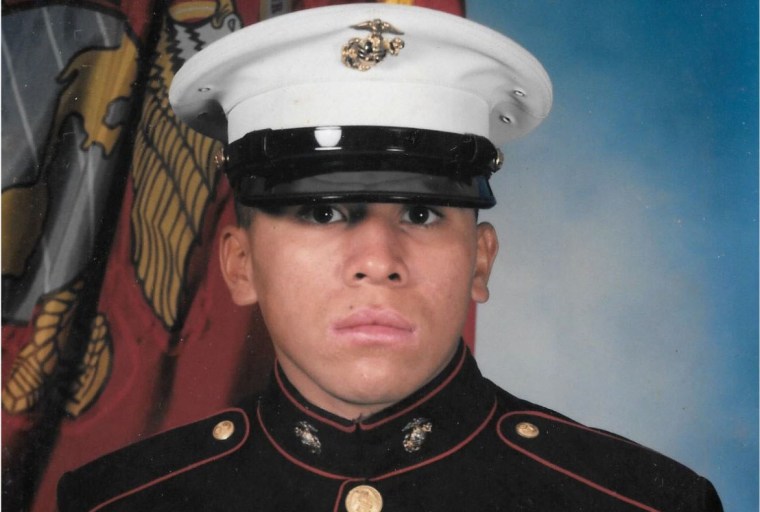A Marine combat veteran whose supporters were seeking a pardon from the governor of California was suddenly deported to El Salvador this week, according to advocates and immigration authorities.
Jose Segovia Benitez, 38, who served in the U.S. Marine Corps from 1999-2004 and was deployed to Iraq, was deported to El Salvador on Wednesday, according to Immigration and Customs Enforcement.
Carlos Luna, president of Green Card Veterans and a supporter of Segovia Benitez, told NBC News on Thursday that the deportation was sudden and “unexpected” after the veteran had been granted a brief stay while his attorneys filed additional paperwork on his behalf.
“From my understanding, neither Jose’s attorneys nor the ICE counsel that was assigned to his case in Adelanto were informed that he was being deported,” Luna said, referring to the Adelanto ICE processing center in California. Segovia Benitez was being held in Adelanto before his deportation process began last week.
His deportation was stayed for a few days, his attorneys said, and he was taken to a detention center in Arizona from where he was then ultimately deported this week.
“So, right now it is unclear who actually ordered his deportation and that’s something we’re trying to find out,” Luna said.
“They basically snuck him out in the middle of the night,” Thomas Sanchez, one of the lawyers assisting with the case, added.
He was processed in a jail in El Salvador before being released, Sanchez said.
While Segovia Benitez previously had legal status, he was ordered to be removed from the country last year after serving several years in prison for drug and domestic violence-related convictions, according to immigration authorities.
His family, advocates and lawyers say that while they do not excuse his past behavior or violence, Segovia Benitez did not get the treatment he needed for post-traumatic stress disorder and a traumatic brain injury sustained during his time in combat and noted he served both his country and his sentence.
Roy Petty, an attorney in the case, discovered Segovia Benitez had been deported only after he arrived at the detention center in Arizona and found his client was no longer there. The veteran’s family had not been informed of his deportation either, according to Luna.
“Mr. Petty is the one that had to inform them after he found out when he got to Phoenix,” Luna said.
Segovia Benitez received multiple awards and decorations during his service, according to Marine and military records. His rib cage is tattooed with a large Statue of Liberty and he has USMC tattooed across one arm.
Sanchez said he feared those tattoos, and the fact that he has not been in El Salvador since he was three years old, could make him a target for gangs and other criminals.
“If anybody has any doubts as to who he was, it’s right there on his arm,” he said.
In a statement Thursday, ICE said Segovia Beneitez had “repeatedly violated the laws of the United States.” An immigration judge ordered him to be removed from the U.S. in Oct. 2018 and a subsequent appeal with the Board of Immigration Appeals was denied, the agency said.
Two stay requests with the U.S. Court of Appeals for the Ninth Circuit were also denied, according to ICE.
His convictions include corporal injury to a spouse, for which he received an eight-year sentence, assault with a deadly weapon, false imprisonment, narcotics possession, conspiracy to commit a crime and driving under the influence, ICE said.
Segovia Benitez is also part of a lawsuit filed in August with 14 other ICE detainees, claiming they were subjected to "horrific" and "inhumane" conditions during their detention.
While his supporters were still hoping for a pardon from California Gov. Gavin Newsom, Sanchez said Segovia Benitez’s attorneys were going to file paperwork to try to reopen his case and bring him back to the U.S.
Newsom’s office said it was unable to discuss individual pardon applications but that each application “receives careful and individualized consideration.”
Sanchez said that while he does not condone violence, Segovia Benitez was “very remorseful” over what he had done and said “I was out of my mind” at the time.
He also said in a domestic violence case against Segovia Benitez, the jury was not allowed to hear any information related to his military service, severe PTSD or his traumatic brain injury. He said he believed Segovia Benitez’s inability to afford a lawyer led him to be convicted of felonies for what should have been misdemeanor charges.
Luna said that as a veteran himself he was “embarrassed about our system and how they treat people who have not only enlisted to support and defend our democracy, but someone who was very close to paying the ultimate sacrifice.”
“He definitely served in some arduous combat deployments, if anyone has earned the right to pay their debt to society and move on with their life it is him,” he said.

